Seasonal allergies cause a lot of misery. Some medications relieve the symptoms, but they often have unpleasant side effects. Fortunately, there are plenty of natural options that can provide relief. We have listed the ten best herbs for allergies to help you get out and about again, no matter the season.
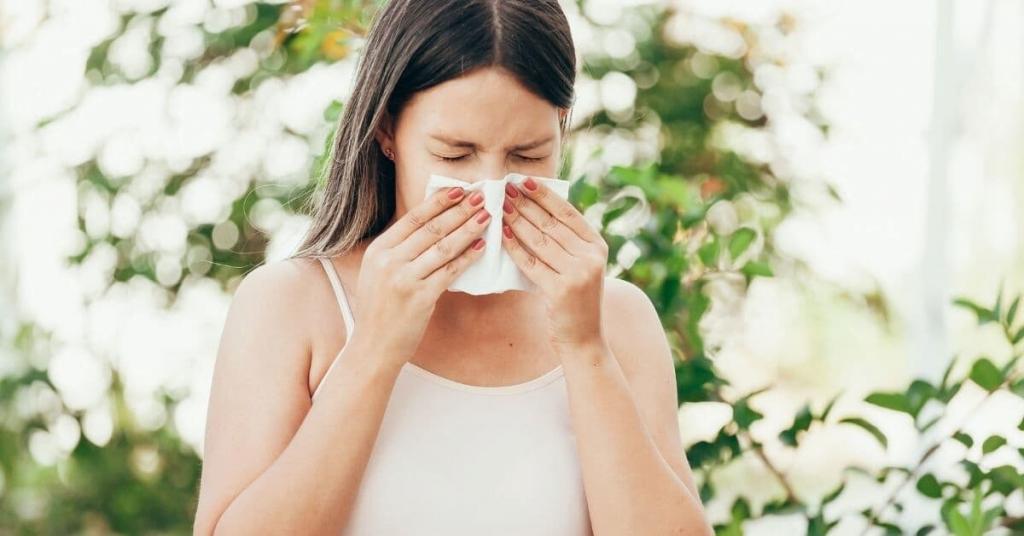
This post may contain affiliate links, which means I’ll receive a commission if you purchase through my links, at no extra cost to you. Please read full disclosure for more information.
Surveys indicate that almost half of all people that suffer from allergies try natural allergy remedies.
Those of us with seasonal allergies know the desperation of needing relief but not wanting to overload our systems with medication.
There are a number of natural remedies available, but finding ones that actually work can be a challenge.
Best Herbs For Seasonal Allergy Relief
Few things can cramp your style more than having a constant postnasal drip or watery, red eyes.
If you are someone who dreads the start of spring because of the increase of pollen, you’ve probably already tried a lot of allergy meds.
Although they are often highly effective against the main symptoms, unfortunately, many bring unwelcome side effects.
But, you can start preparing now to tackle this year’s allergy season naturally if you know what to use.

Tips For Treating Allergies Naturally & Creating A Healthy Immune System
There are many herbs that pack a punch to inhibit allergic responses.
Of course, they can’t work optimally if the rest of your diet is unhealthy, your gut is unhealthy, or your liver needs a little love.
So, in addition to reading about the health benefits of the herbs below, please remember…
- to add more beautiful fresh produce every day and eat a healthy diet
- everybody responds differently, and what may work for one person’s symptoms might not work for you (you may have to try a few natural remedies before finding the one that works best)
- herbs are generally safe and have fewer side effects than allergy medicine but they can interact with medications so be sure to talk to your health care provider before stopping or starting any medication
Ok, now that we have gone over a few important tips, let’s take a look at 10 herbs that have excellent soothing and healing properties and are effective for spring allergies!
1. Butterbur
Butterbur is a member of the daisy family and has been used by seasonal allergy sufferers for years, but is recently getting more attention.
This natural remedy shows promising results in providing relief for allergic rhinitis symptoms.
Butterbur is a smart choice for anyone who needs to avoid the sedative effects of antihistamine medications.
Some evidence suggests that butterbur plant root is as effective at remedying nasal symptoms as well-known allergy medication.
However, one note of caution is that this herb should be avoided by anyone whose seasonal symptoms are triggered by ragweed.
Butterbur is related to this common spring allergen, and taking it may cause an allergic reaction in someone sensitive to it.

2. Garlic
Garlic is a staple in many homes. It adds a delightful flavor and aroma while cooking, and as an added benefit, it can be a powerful ally if you are experiencing spring allergies.
Garlic contains quercetin, a natural compound that acts as a natural antihistamine.
Histamine is the chemical that produces an inflammatory immune response when triggered by seasonal irritants, like pollen or mold spores.
By keeping your histamine levels down, you will experience less of the characteristic unpleasant allergy symptoms like frequent sneezing, nasal congestion, runny nose, or watery eyes.
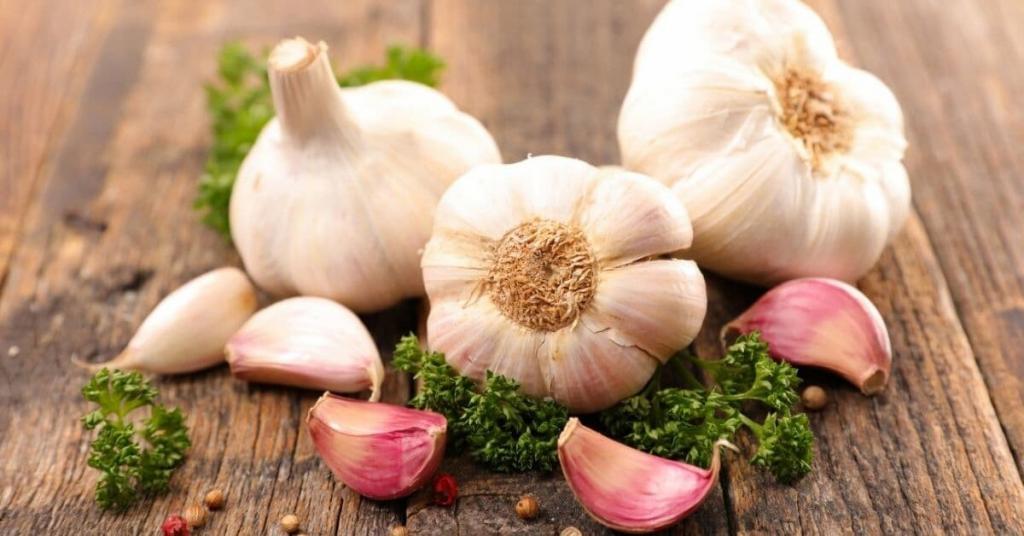
3. Stinging Nettle
It may seem strange that a stinging plant has beneficial anti-inflammatory properties.
However, it turns out that components of the nettle plant (Urtica Dioica) can offer great relief in the fight against seasonal allergies – and there are numerous studies to prove it.
Stinging nettle is known to:
- reduce allergy symptoms by decreasing inflammation in a nasal passage
- lowering histamine production
- support immune function
- have antioxidant effects
- be an excellent source of vitamins and minerals
Nettle is one of the most common natural medicines known and has been used for centuries, but before you start harvesting this potent anti-inflammatory, remember that you need to be extremely careful and avoid touching a stinging nettle leaf plant.
If you’re not interested in harvesting and drying your own herbs, you can find commercially available dried leaves in local health food stores or online that make a wonderful stinging nettle infusion or nettle tea. Capsule form or nettle extracts are also options to consider.

4. Horehound
Even if you have never heard of this popular herb before, in all likelihood, you have already consumed some Horehound.
It is a common ingredient in both lozenges and cough syrups. This is because the chemicals in this plant are great for thinning mucus and decreasing swelling.
If you plan to make a tea from horehound, keep in mind that it is not the best tasting on its own, so you may need to add some honey or mint to make it more palatable.
Fresh horehound is not always available, but it is relatively easy to grow and does well in pots so long as you have a sunny spot.
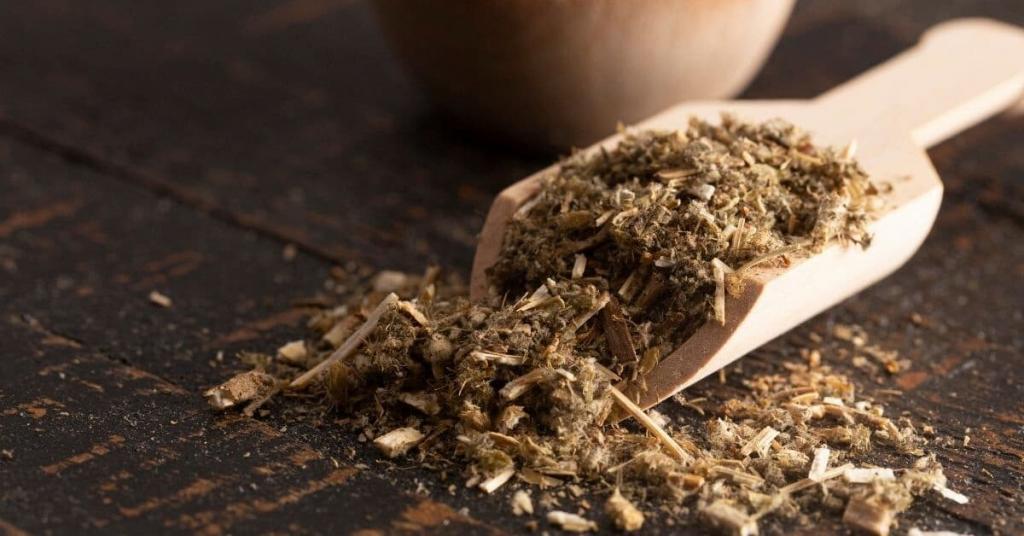
5. Turmeric
Along with garlic, turmeric is one of the most common everyday herbs that can help to support immune health and relieve the symptoms of an allergy sufferer.
The active ingredient called curcumin can help improve seasonal allergy symptoms by minimizing the swelling and irritation of allergies and hay fever.
To increase this natural immune enhancer, be sure to pair turmeric with black pepper, whether in your recipes, tea blends, or in supplement form because this increases the bioavailability of curcumin.

6. Rosemary
Rosemary is not only delicious in food but it has been found to have anti-inflammatory and antioxidant effects.
The good news for people who suffer from seasonal allergies is that it has also been found to relieve allergy-related inflammation and improve symptoms of asthma, which often overlap with the tight chested wheeziness experienced by allergies.
You probably won’t be able to eat enough rosemary to have a big effect on asthma symptoms, but you can take a rosmarinic acid supplement.
Just be sure to take it with meals to avoid upsetting your stomach.
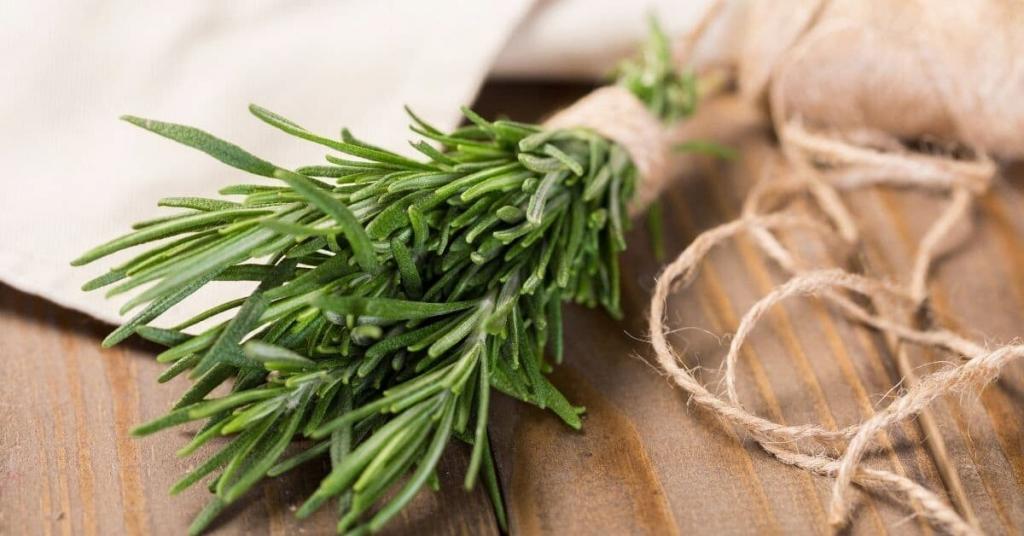
7. Goldenrod
Goldenrod is sometimes blamed for causing common allergy symptoms. It turns out, though, that this is a beneficial herb that just happens to grow in the same places and blooms at the exact same time as the real culprit, ragweed.
Goldenrod is most commonly used as a diuretic, which means that it encourages the body to let go of excess fluid.
It is also helpful for relieving symptoms of allergies by thinning mucus, reducing inflammation, and can be helpful to improve immune function.
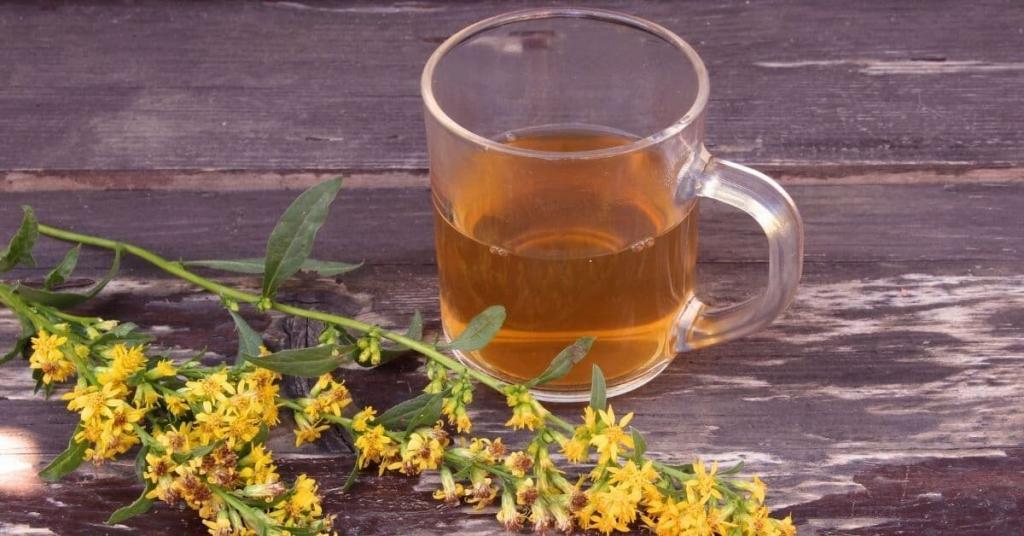
8. Mullein Leaf
Mullein leaf was a common herbal supplement and popular treatment for people with tuberculosis in the 1800s and it is still used today by many for treating springtime allergies with symptoms including coughs and congestion.
Mullein leaf can be used as a tea using fresh leaves, although this needs to be done carefully because of the tiny hairs on the leaves.
Fortunately, it also comes in capsules and may help support the lungs when they are irritated, inflamed, or if someone is struggling with allergic asthma.
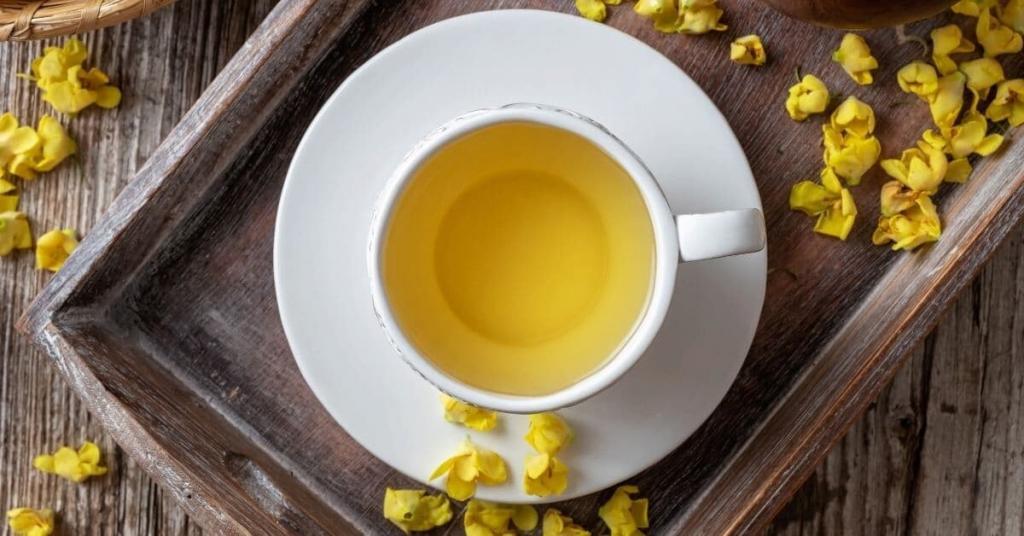
9. Horseradish
Horseradish is a tried and tested method to clear your nasal passages.
It thins the mucus, making it easier to expel, and helps airways feel less congested.
Add it to food to give a distinctive sharp flavor that your sinuses will thank you for.
You can use horseradish for allergy and hay fever symptoms by adding some grated root to boiling water.
Using this tangy herb will have a pretty instant effect on clearing your sinuses.
Unfortunately, although it is fairly immediate, it will only be temporary.
Horseradish works best when it is fresh – just be sure to keep your tissues ready!

10. Berberine Rich Herbs
Berberine is a bright yellow alkaloid found in herbs like barberry, Oregon grape root, and goldenseal that is helpful to treat allergic rhinitis and hayfever symptoms and is often used as a natural kidney tonic.
The ingredient is reported to help dry out overactive mucus production associated with allergic rhinitis.
Herbs rich in berberine are also great for sinus congestion because they are effective antibacterial and antifungal agents.

FAQs About Herbs For Allergy Relief
Still have a few questions about herbs for allergy relief? I’ll try to answer a few of them here 🙂
1. What Causes Allergic Rhinitis?
Allergies are a common allergic response to a trigger such as pollen or mold, which are more prevalent during particular times of the year.
When someone is exposed to these substances, the immune system goes into overdrive. The body then produces a large amount of a chemical called histamine which causes classic allergic reactions including congestion, sneezing, wheezing, and itchy eyes.
Like medication, some allergy supplements and herbs can help block the chemical reaction that the body’s immune system has to the increase of triggers in the air.
There is plenty of debate about which natural products work best, but experts all agree that you need to start priming your system long before the change of the season.
2. How Do Herbs Provide Allergy Relief?
Many herbs with natural antihistamine properties can help allergy sufferers by supporting the immune system, reducing allergic reactions to airborne pollen, dust mites, and other allergens as well as reducing mucus, and soothing irritating coughs.
But, herbal remedies do not work the same as popping a medication which will often provide fast but temporary relief to symptoms.
While your favorite natural remedy can have excellent anti-inflammatory abilities and help lower inflammatory events, they typically need more time to work properly.
So be sure to start taking your herbal remedy of choice long before allergy season starts!
3. Which Herbs Are The Best Antihistamines?
Histamine is the chemical your body releases when a substance it identifies as an enemy comes into contact with mucus membranes in your nose, mouth, throat, or lungs.
In the case of someone with seasonal allergies, these enemies are things like pollen and mold.
Most allergy medications work as antihistamines to block the production of histamine. And most of them do, unfortunately, have side effects that often include drowsiness.
But, luckily for us, some herbs contain substances that act as natural antihistamines so allergy sufferers can find safe relief without the side effects!
Last Thoughts About The Best Herbs For Allergies
Seasonal allergies are common, and many people have turned to herbal remedies to avoid the side effects of antihistamine medications.
Thankfully, there are plenty of valuable plants in nature’s medicine kit that have been used safely for thousands of years to improve overall health and reduce the severity of many symptoms.
Give your immune system a boost with an allergy-fighting herb so you can have an edge over seasonal allergies this year!
Related Articles
- Homeopathic Remedies For Allergies: 11 Options For Fast Relief!
- 13 Best Essential Oils For Allergies
- Stinging Nettle Infusion: Benefits, Recipe, & Helpful Tips
- 13 Natural Decongestants (That Work Fast!)
- Xylitol Nasal Spray: Effective Natural Relief For Nasal Congestion
- Nasaline: A Nasal Rinsing System For Sinus & Allergy Relief
- Indoor Air Quality: 14 Easy & Natural Tips To Improve The Air You Breathe

